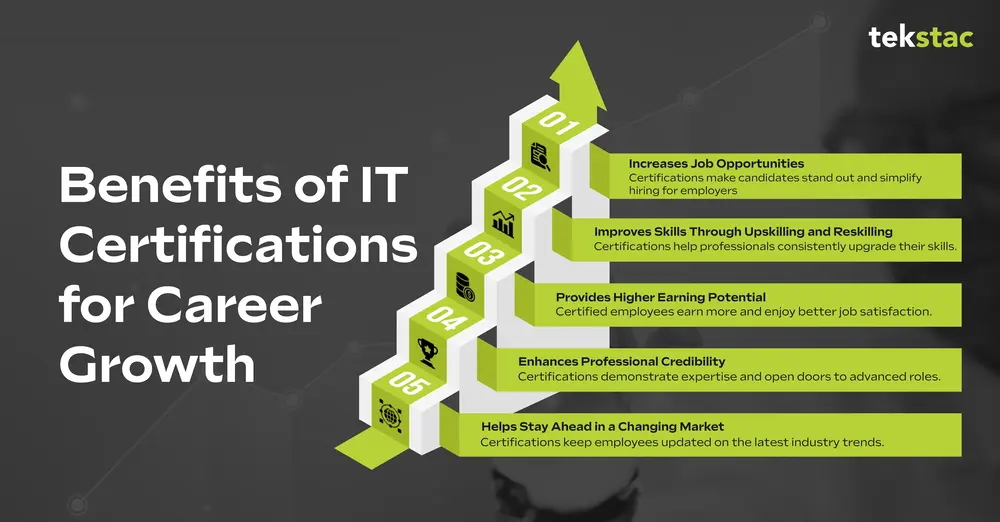Top 10 IT Certifications to Boost Your Career in 2026

Last updated on January 28th, 2026
We are in 2026, and one may ask, “Are IT certifications still credible?”. A thought-provoking example surfaced recently: someone with the title “Specialist in Digital Transformational Technology” proudly shared completing a basic AI prompting course. Sounds odd, right?
This highlights a growing challenge in IT upskilling: too many professionals chase easy online certificates just to look credible on paper.
A smart IT professional focuses on certifications that strengthen their foundation, broaden their capabilities, and prepare them for real-world challenges. Employers are increasingly able to distinguish between superficial credentials and actual competency.
With that in mind, here are 10 top paying IT certifications in demand for 2026.
What are IT Certifications?
IT certifications are professional designations offered by organizations and companies to validate your expertise in specific skills, tools, and IT knowledge areas. They provide structure to learning and upskilling, ensuring that professionals gain the confidence to apply their knowledge in real-world scenarios.
Why IT Certifications Matter in 2026
IT certifications show employees’ commitment to continued learning by upholding industry standards and professionalism. This helps IT professionals immensely in 2026 due to other significant reasons:
1. Increase in remote work
Remote work has made the tech job market more competitive. With talent pools now competing from across the globe, employers are flooded with applications. IT certifications offer a way to rise above the crowd of professionals and organizations. A study by CompTIA also found that 80% of HR professionals rely on certifications when evaluating candidates.
2. Focus on individual value
Along with skills, IT certifications also improve paychecks. Professionals with certifications in high-demand fields like cybersecurity and cloud computing also command top-tier salaries.
3. New trends and technologies
Even if a job doesn’t require certifications, earning one can increase the chances of promotions compared to peers or help employees land their dream role. Organizations can also ensure that employees possess the right skills to adapt to new IT trends.
10 Most in-demand IT Certifications for 2026
1. Certification in Cloud Platforms
According to IDC, the overall Indian public cloud services market is expected to reach $30.4 billion by 2029. This shows that cloud computing is a skill in high demand. Being certified in this area builds expertise in managing and optimizing enterprise-grade cloud solutions, increasing the value of a role focused on scalable infrastructure and cloud migrations. Some of the cloud certifications one can do include,
- Google Certified Professional Cloud Architect
- AWS Solutions Architect – Associate
- Microsoft Certified: Azure Fundamentals
2. Certification in Hybrid Cloud Architecture
The below certifications position employees as the go-to experts for designing and managing interconnected on-premises and cloud systems. These are important for businesses embracing hybrid setups for flexibility.
- AWS Certified Solutions Architect – Professional
- Certified Cloud Security Professional (CCSP)
- Certificate of Cloud Security Knowledge (CCSK)
- Google Cloud Certified – Professional Cloud Security Engineer
3. Certification in API Management, Data Integration, and ETL
This IT certification provides the necessary skills and hands-on experience to streamline data workflows and enable seamless application integration. Organizations undergoing digital transformation highly demand such skills.
- Google Cloud Apigee Certified API Engineer
- Microsoft Certified: Azure Data Engineer Associate
- Informatica PowerCenter Data Integration Certification
- Talend Data Integration Certification
4. Certification in AI Data Privacy and Security
The following certifications in AI data privacy and security validate a person’s capability to safeguard sensitive AI-driven processes, a critical skill as companies face increasing regulatory scrutiny over data protection and compliance.
5. Certification in Advanced AI/ML
AI and Machine Learning have become the norm, and being certified in this field enables employees to lead challenging projects involving deep learning, NLP, or predictive analytics in high-demand industries.
- Google Cloud Professional Machine Learning Engineer
- Deep Learning Specialization by Andrew Ng (Coursera)
- Professional Certificate in Machine Learning and Artificial Intelligence (MIT)
6. Certification in Cybersecurity Leadership & Risk Management
Certifications in this area validate the ability to manage enterprise risk, design security strategies, and align cybersecurity initiatives with business goals.
- Certified Information Systems Security Professional (CISSP)
- Certified Information Security Manager (CISM)
Pro tip: This isn’t something to rush. The scope is wide and the depth is real. A six-to-twelve-month preparation window allows for steady progress.
7. Certification in IT Governance, Risk, and Compliance (GRC)
With stricter regulations and growing focus on accountability, organizations need professionals who understand governance frameworks, audits, and compliance requirements. These IT certifications demonstrate expertise in evaluating IT controls, managing risk, and ensuring regulatory alignment—making them valuable for senior and advisory roles.
- Certified Information Systems Auditor (CISA)
- ISO/IEC 27001 Lead Implementer
- ISO/IEC 27001 Lead Auditor
8. Certification in Networking & Infrastructure Management
Despite the rise of cloud and AI, strong networking fundamentals remain critical. Certifications in this area validate the ability to design, manage, and troubleshoot enterprise networks that support large-scale digital operations and hybrid environments.
- Cisco Certified Network Associate (CCNA)
- Cisco Certified Network Professional (CCNP)
9. Certification in IT Project & Program Management
Project and program management certifications validate leadership skills in planning, coordination, risk management, and delivery.
- Project Management Professional (PMP)
- PRINCE2 Practitioner
10. Certification in Enterprise Architecture & Digital Transformation
Enterprise architecture plays a critical role in aligning technology with long-term business strategies. Certifications in this domain validate a professional’s ability to design scalable systems, guide digital transformation initiatives, and make architecture-level decisions that impact the entire organization.
- TOGAF (The Open Group Architecture Framework)
- Certified Enterprise Architect (CEA)
Benefits of IT Certifications for Career Growth
Earning these certifications provides several benefits, especially for employee career development, in the following ways:

1. Increases job opportunities
Employers are always looking for candidates with IT certifications because it shows they’re competent and ready for specific roles. It further helps recruiters identify top talent, especially in a competitive market where 82% of employers face a skill gaps. Ultimately, hiring certified professionals will reduce the time spent training new employees.
For employees, 16% of IT professionals reported landing a new job because of their certifications, while 35% of IT decision-makers acknowledged that certified staff add value by simplifying the hiring process.
2. Improves skills through upskilling and reskilling
Most IT certifications validate an employee’s ability to solve real challenges. With 75% of professionals pursuing certifications to increase technical expertise, employers benefit from a workforce that consistently upgrades its skills.
Certified professionals help reduce skill gaps within teams and increase the organization’s overall competency.
This makes it easier to implement new technologies and maintain a competitive edge in the market.
3. Provides higher earning potential
Certified professionals earn 20% more annually than their non-certified peers, and 60% report an improvement in the quality of their work after obtaining certification. Organizations offering better pay to certified employees also benefit from increased loyalty, retention, and job satisfaction.
4. Enhances professional credibility
Earning IT certifications helps employees demonstrate their expertise and projects.
For example, certifications like Microsoft Azure Solutions Architect Expert or Cisco CCNP demonstrate proficiency and open opportunities for advanced roles.
These include positions like Cloud Architect, Network Engineer, or Cybersecurity Specialist, where specialized knowledge is essential.
5. Helps stay ahead in a changing market
Certifications help employees stay current on the latest tools and techniques, ensuring they’re always in tune with industry changes. This means certified professionals bring fresh, updated insights to the workplace, helping organizations stay ahead.
For employers, this expanded network and knowledge base translate into better service, increased customer satisfaction, and increased innovation. It is a win-win for both the employee and the organization.
Key Indicators That Signal the Need for IT Certifications
When do IT certifications become essential for your employees? These specific challenges listed below are a clear sign to explore IT certifications:
1. Skill gaps in core IT areas
If your organization is having trouble completing projects on time or dealing with recurring technical issues, it may be a sign that employees lack the required skills. IT certifications address these gaps by equipping your team with up-to-date cybersecurity, cloud computing, or software development knowledge.
2. Lagging behind industry standards
The IT industry is being reshaped at a pace never seen before, and organizations that cannot keep up may be left behind. If your teams struggle to adopt or leverage emerging technologies, certifications can bridge the gap. Certified professionals gain an in-depth understanding of industry best practices and provide solutions to organizational challenges.
3. Difficulty meeting client expectations
Certifications can prove your team’s expertise if you’re losing business or struggling to build trust with clients. These certifications, along with experience, can be highlighted on your website, LinkedIn, or marketing materials to reassure clients that your workforce is capable and qualified to handle their needs.
4. Expansion into new and emerging technology
Certified team members make it much easier to shift to new specialist areas such as machine learning, DevOps, or cloud computing. This ensures that the employees have clear learning paths with hands-on practice when resolving new, complex domains.
5. Retention challenges
Opportunities for professional development are valued among employees. If your organization struggles to retain talent, providing support for certifications, such as reimbursing costs or providing study time, would also increase employee satisfaction. Such initiatives would not only enhance individual performance but also prove that your organization is committed to the career growth of its employees.
Start Investing in Your IT Future
Traditional learning and training methods may not tie the learning to business outcome. To bridge the skills gap smarter, organizations need a platform packed with industry-relevant IT certifications and skill development programs. Tekstac has successfully upskilled 1 million+ professionals with 500+ learning paths.
Its customizable library of certifications and training resources ensures your workforce possesses the required skills in 2026 and beyond. You can also enjoy AI-driven personalization, real-world projects, and performance tracking. Learn more about how Tekstac has got you covered.
FAQs on IT Certifications
1. What are the top certifications for career growth in 2026?
For career advancement in 2026, certifications in cloud platforms, hybrid cloud architecture, AI/ML, data integration, and cybersecurity are in high demand. Credentials like AWS Solutions Architect, Google Cloud Professional ML Engineer, and CCSP help professionals stand out, unlock leadership roles, and command higher salaries across industries.
2. How can Tekstac help with IT certifications and upskilling?
Tekstac offers a curated library of 500+ learning paths with AI-personalized learning, performance tracking, and real-world projects tailored to employee roles and business outcomes.
3. How do IT certifications benefit organizations?
They help close skills gaps, improve team performance, reduce onboarding time, and boost client trust by proving the team’s capability through verifiable credentials.
4. Do certifications really improve job performance?
Yes. Over 60% of certified professionals report improved work quality, and many employers observe faster project delivery and innovation from certified staff.





